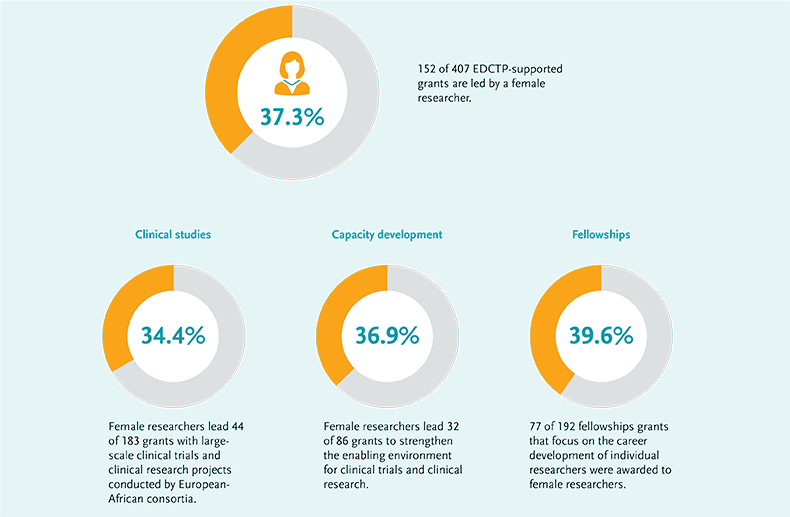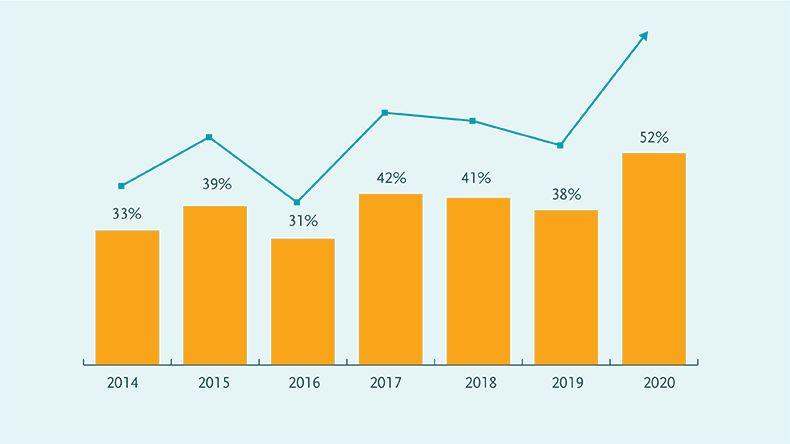International Women’s Day 2021: a challenge to inequality
In her statement for International Women’s Day 2021, Winnie Byanyima, the Executive Director of UNAIDS and Under-Secretary-General of the United Nations, focused on inequality in education and said: “Gender inequality is not only wrong. It is dangerous. It weakens us all. A more equal world will be better able to respond to pandemics and other shocks; it will leave us healthier and safer and more prosperous.”
The theme chosen for International Women’s Day 2021 stresses the need for action, for challenging the roots of the current inequalities: “A world challenged is an alert world and from challenge comes change. So let’s all choose to challenge.”
“EDCTP is fully committed to - and already implementing through tangible actions - policies that promote equality and fairness from a gender perspective. We celebrate the rising number of female researchers across the board and especially in our individual fellowship grants that are aimed at developing scientific leadership and world class competitiveness.”
Dr Michael Makanga, EDCTP Executive Director

Promoting gender balance
An interim review of the EDCTP2 programme recommended the organisation to find ways to address geographic and gender-related imbalances in funding. Consequently, EDCTP performed a situation analysis on the gender-balance in its processes and calls and grants activities (data 2014-2019). Across all its funding schemes, 63.7% of grant reviewers were male and 36.3% were female, and this ratio has remained broadly stable over EDCTP2’s time. Women made up 37.7% of the participants in the scientific review committee meetings. Women also carried out 44.1% of the ethics evaluations and made up 42.7% of the members of ethics review panels.
Disparities in funding have been discussed further at a workshop organised by EDCTP and Africa CDC in Addis Ababa on 19-20 November 2019. The workshop aimed to clarify the challenges underlying regional and gender imbalances within health research in sub-Saharan Africa, identify collaborative strategies to improve the distribution of funding and align EDCTP efforts with those of like-minded partners.
A complex set of factors results not only in gender imbalances in research funding but also in the clinical research conducted. Women are significantly under-represented in research in sub-Saharan Africa (and other regions), are disadvantaged within certain societies or have particular interests that need to be considered in the design of clinical research studies. Ethics review may be one of the instruments needed to address these challenges.
EDCTP has funded a proposal on ‘gender mainstreaming’ by the BCA-WA-Ethics consortium. The project aims to mainstream a gender perspective into the activities of regulatory authorities in Senegal, and more generally encourage the adoption of good gender-related practices in clinical research in West Africa.
In March 2020, the consortium organised its first international congress on gender mainstreaming. Later in the year, it launched its first policy brief, ‘A Framework for the Ethical Evaluation of Research Protocols from a Sex and Gender Perspective during the COVID-19 Pandemic and Other Epidemics’ and a ‘how-to’ guide for national research ethics committees and institutional review boards, ‘The ethicist’s guide to the evaluation of preclinical research from a sex and gender perspective’, which was published in February 2021. The BCA-WA-Ethics consortium also received follow-up EDCTP funding to extend the project’s initial work and more generally strengthen national ethics review capacity.

Women researchers steering EDCTP grants
Fortunately, there are many examples of female researchers in Europe and Africa leading major programmes of work, including, by way of example:
Dr Angela Loyse (St George’s, University of London, United Kingdom), is the coordinator of DREAMM. The study aims to integrate the diagnosis and management of HIV-associated central nervous system infections into routine health services in low- and middle-income countries.
Dr Catriona Waitt (University of Liverpool, United Kingdom) is the coordinator of the VirtUAL study which seeks to define the best and safest treatments for patients who require treatment for tuberculosis (TB) whilst receiving second-line antiretroviral therapy (ART). These conditions disproportionally affect the world’s most vulnerable populations including pregnant women, children and adolescents. Reducing mortality will not be achieved without a specific focus on these populations who are often excluded from clinical trials.
Dr Mutsa Bwakura-Dangarembizi (University of Zimbabwe) is the coordinator of the CHAPAS-4 study which aims to identify suitable second-line therapies for children with HIV who are not responding to first-line drugs.
Prof. Ayesha Kharsany (CAPRISA, South Africa) is the coordinator of one of the projects funded under the 2020COVID-19 Emergency call, the HALT_COVID-19 study. It aims to characterise clinical disease progression and clinical outcomes in patients with SARS-CoV-2 viral infection and to perform a clinical evaluation of COVID-19 testing kits in South Africa.
More information
- UNAIDS Executive Director’s statement on International Women’s Day 2021
- United Nations observance of International Women’s Day 2021
- International women’s day (international support platform)
- Workshop report: EDCTP-Africa CDC Workshop – Collaborating to improve gender-related and regional disparities in research funding
- For the documents on gender mainstreaming, see the website of the BCA-WA-Ethics consortium.
- DREAMM project
- VirTUAL project
- CHAPAS-4 project
